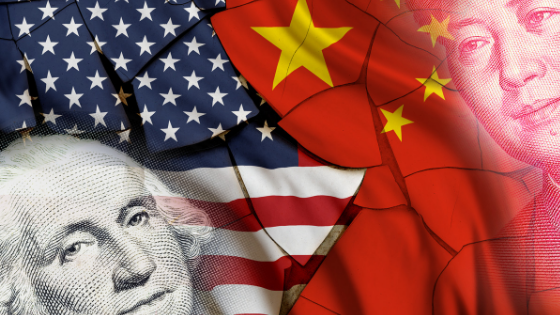By David J. Lynn, Ph.D.
China has become increasingly integrated into America’s economy with a wide range of industrial and consumer goods being imported from China including electronics, clothing, furniture, drugs, food products, machinery and many high-technology components that are essential for our national defense. In fact, in the US, it is virtually impossible to avoid goods made in China, with fewer and fewer alternatives available for a wider variety of goods.
Despite this deepening economic integration, China continues to act as a global economic predator, ignoring the rules, laws, norms, regulations of the modern international political and economic system, all the while disingenuously espousing to be a good global citizen. China has long been an economic competitor and foe of the US, actively and systematically weakening the US economy through intellectual property theft, currency manipulation, formal and informal tariffs, illegal regulations, extensive trade mercantilism, forced partnerships and technology transfers, and industrial espionage. Moreover, China has become even more authoritarian and repressive in recent years, evolving into a full-blown totalitarian state under President Xi’s lifetime dictatorship. In the last few years, China has become increasingly belligerent, threatening its Asian neighbors with an expanding and aggressive military.
Is this really the type of country America wants as a significant long-term economic partner?
The Making of an Economic Predator
For over 30 years, economic arguments against China’s mercantilist and predatory economic policies have taken a backseat to the political and policy imperatives of the US. America’s hope was that if China develops, becomes wealthier, with a large middle class and is more fully integrated into the global economy, it will become more like us–democratic, free, and with open markets/free trade. Thus, trading with China was not initially about trade, it was an economic means to a political end. Thus, until recently, China has had a free hand to be a bad actor on the world’s economic stage with virtually no sanctions.
Ironically, much of the hands-off approach towards China’s trade and economic policies has been heavily influenced certain American multinationals (MNCs) who have heavily invested in China over the last 25 years and who derive a growing share of their revenues from that country. These MNCs have influenced media and public opinion by deliberately down-playing China’s bad actor behavior. However, with the recent explosion of discussion and debate arising from the tariffs and currency manipulation disputes with China, more and more Americans are beginning to question the very relationship with this country.
China, The Communist-Totalitarian State
Totalitarianism is a form of rule in which the government attempts to maintain “total” control over society, including all aspects of the public and private lives of its citizens. China embodies every single characteristic of a totalitarian regime:
- Rule by a single party
- Total control of the military
- Total control over means of the media and communication (internet, television and radio)
- Constant dissemination of pro-government propaganda through multiple channels
- Prohibition of certain religious or political groups and practices
- Prohibition of any form of public criticism of the government
- Police control with accountability only to the authoritarian leadership
- Control of the economy
China is also the biggest surveillance state in the world, and it is actively categorizing all of its nearly 1.4 billion citizens in terms of their “Social Credit.” The Social Credit System is an Orwellian program is designed to suppress dissenters and non-conformists. The system will usher in a new era of mass control and surveillance of every citizen and every company, not even achieved under Nazi Germany or Stalinist Russia.
China now has the second-largest defense budget in the world and the largest standing army of ground forces, the third-largest air force and a navy of 300 ships and more than 60 submarines. China is also pursuing advances and actively purloining America’s intellectual property in artificial intelligence, engineering and technology, space exploration, anti-satellite capabilities, long-range cruise missiles (capable of reaching the US mainland) and hypersonic glide weapons.
Need for a Fresh Look
One could argue that America, being the biggest single buyer of Chinese goods at over a half trillion dollars per year, is perhaps the single greatest economic enabler and supporter of the Chinese totalitarian state. The question is, should we continue to economically support China in its steady evolution towards and ever more repressive and totalitarian state?
It’s important to recognize that the American public has rarely been stirred and motivated to take action through economic arguments alone. Our own revolution for independence focused primarily on freedom, individual rights and democracy rather than our unfair economic relationship with the British Empire. What has consistently galvanized the US is the fight for higher ideals and values. Nearly all of America’s wars since the Second World War have been about resisting communism, authoritarian or totalitarian states—i.e., Nazi Germany, the Soviet Union, China (Korean War), Communist Vietnam and Iraq and Afghanistan. So perhaps it is time to recognize a China as the economic and military foe that it is and question our economic relationship with it.
Share this page and leave your comments below:













